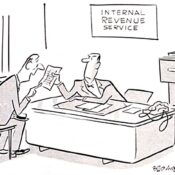In 1930s, humorist J.P. McEvoy wrote the Post column “Father Meets Son” presented to readers in the form of letters filled with advice for navigating life’s rocky road. Employing a mix of wry humor and tough love, Dad doled out life lessons on everything from work to women. Readers loved it.
Now that his son has some money coming in, Dad offers his financial advice: Ignore the recommendations of bankers, the government, and businessmen to save your money. Spend it instead. Spending wisely is more difficult than saving wisely, but its rewards are much greater.
Father Meets Son: Invest in Yourself
J.P. McEvoy
Originally published on February 13, 1937
Dear Son: Now that you have started to earn a little money, you are going to be swamped with advice on how to spend it. I hope you won’t mind if I put in my two cents’ worth. I feel unusually qualified to discuss thrift, since I have seldom practiced it. Some people make money by saving it. Others make money by spending it. Fundamentally, this is a matter of temperament. Some people can give till it hurts. Others you have to hurt before they’ll give.
For good or bad, you have inherited or acquired some of my idiosyncrasies. Your complete lack of interest in saving money is one of them. In one way, this distresses me. In another way, it gives me great hopes for you. It distresses me because you are going to run into a lot of trouble that easily could be avoided. It pleases me because too often boys who start out loving money a little grow up to be men who love it too much.
You are going to hear a lot about saving money for a rainy day and investing it for your old age. It may sound like heresy to you, but I don’t believe very much in it. People who worry too much about rainy days can’t enjoy the sunny ones, and people who spend their youth worrying about their old age, wind up spending their old age regretting their youth.
But one should save, you say. Very true. You should save because it is good discipline. You should save in order to acquire a surplus. But what should you do with your surplus? Bankers will tell you to put it in a savings account, where you’ll get 2 percent for it. Businessmen will tell you to put it into a business, where you will get 5 percent with safety and 10 percent with luck. The government will tell you to put it in government bonds. Who am I, to go against all these people?
Not so long ago, I was talking to a friend who is an international authority on finance. I said to him: “Suppose I had $25,0000 to give you to invest for me, and all I wanted to be sure of was that I would get the principal back in 25 years — just my $25,0000, never mind the interest. What would you put it in?” He thought it over for a long time, and then said: “I’ll be honest with you. I don’t know.”
I was in Berlin when I paid a million marks for an umbrella. A few months earlier, this would have been the equivalent of $250,000. A few days later, 5 million marks wouldn’t buy a newspaper. You have lived to see marks and rubles come and go, francs and liras shrink, pounds and dollars act as though they were made of rubber. You have seen stocks vanish, bonds disappear, farms go begging, banks go blooey. All the world over, those who put their faith in money, and money alone, took a terrible beating. Only those who invested their capital in the resources of their minds and the skill of their hands survived with their capital unimpaired.
You will live another 25 years and more, God willing, and you will see a lot of changes over which you will have no control. The only ones you can do anything about are those in yourself. You can control those. You can build up your own capital by investing wisely in your own resources. You can learn trades and skills and professions. You can equip yourself to be of service to your fellow men in a dozen different ways. When a social structure is wrecked, it’s those who have who suffer most, not those who can do. Should that day ever come to you, you will be better off if you have invested your $100 in learning how to lay bricks rather than in stock in a brickyard.
So I say buy stock in yourself. Invest your money in your education. Spend it for culture. Buy knowledge and hope for wisdom. Acquire books, subscribe for magazines. Go to concerts and exhibitions and learn how to hear music and see art. Travel and study the genus homo in all his habitats. One hundred dollars invested in a bond will bring you $3 a year, unless something happens to the bond. But $100 invested in acquiring knowledge or skill will bring you dividends of pleasure and profit as long as you live. Your principal will be invested in a business you control. It will be where you can watch it. Booms can’t inflate it and depressions can’t wipe it out. Thieves can’t steal it. Sharpers can’t snitch it. Relatives can’t borrow it.
What you don’t invest in yourself, invest in others. It sounds cold-blooded, but even from a practical viewpoint, this is the best investment of all. There is no better way to get than to give, especially if you always give with the idea of helping others to help themselves. Give opportunity rather than money. Give money rather than advice. And don’t give advice.
Of course, as far as you and I are concerned, I don’t feel that this is advice. I’m just sort of talking out loud to myself. As I told you before, some people make money by saving it, others by spending it. Learning how to save and learning how to spend are two sides of the same nickel. Learning how to save is again a matter of planning. We talked that over before. How much you should save, or how little, is not nearly so important as saving something — anything — regularly.
You can deliberately acquire the habit of saving, just as you casually acquire the habit of spending, and the one habit can and will displace the other. Learning how to spend is more difficult. There is very little technique involved in deciding whether you should save 10 percent of your salary or 25 percent. But the technique of spending wisely is a lifetime study. You must know standards and appreciate values. You must learn early the difference between spending to acquire and spending to impress. Don’t be like the social climber, who spends money he hasn’t got to buy things he doesn’t need to impress people he doesn’t like.
Affectionately,
Dad
Previous: Second Job
Coming soon: The Other Fellow
Become a Saturday Evening Post member and enjoy unlimited access. Subscribe now



